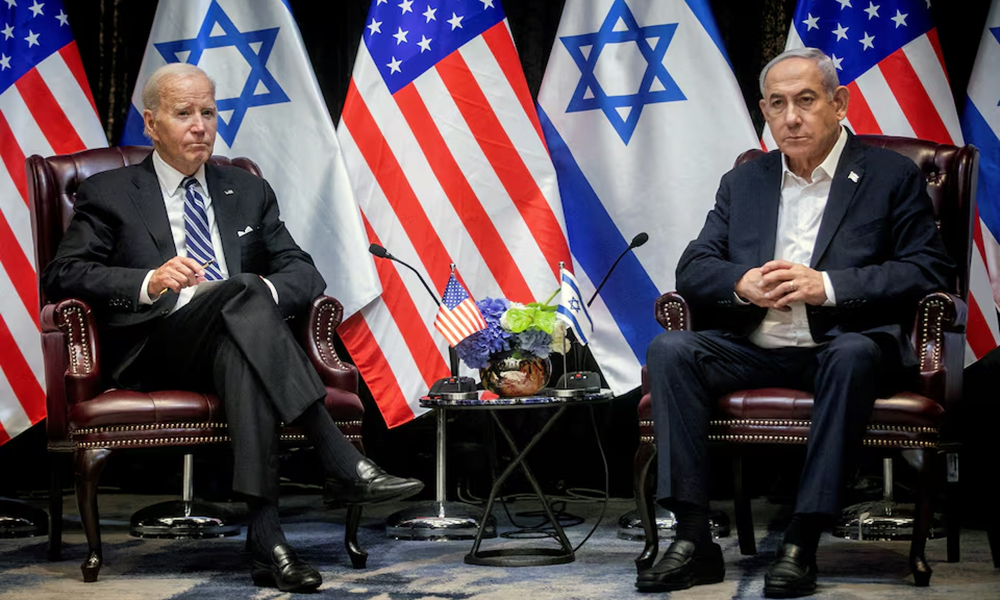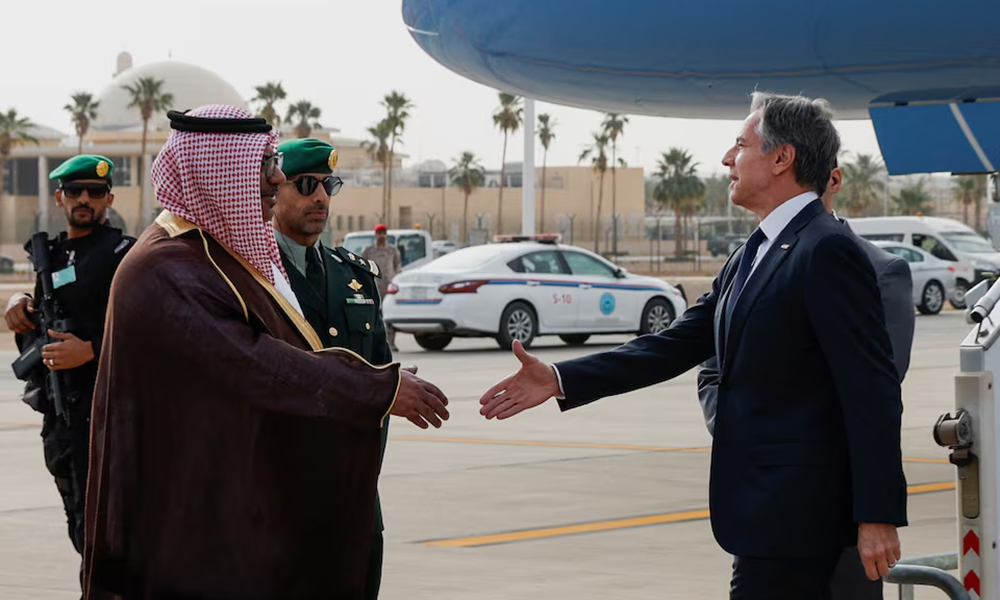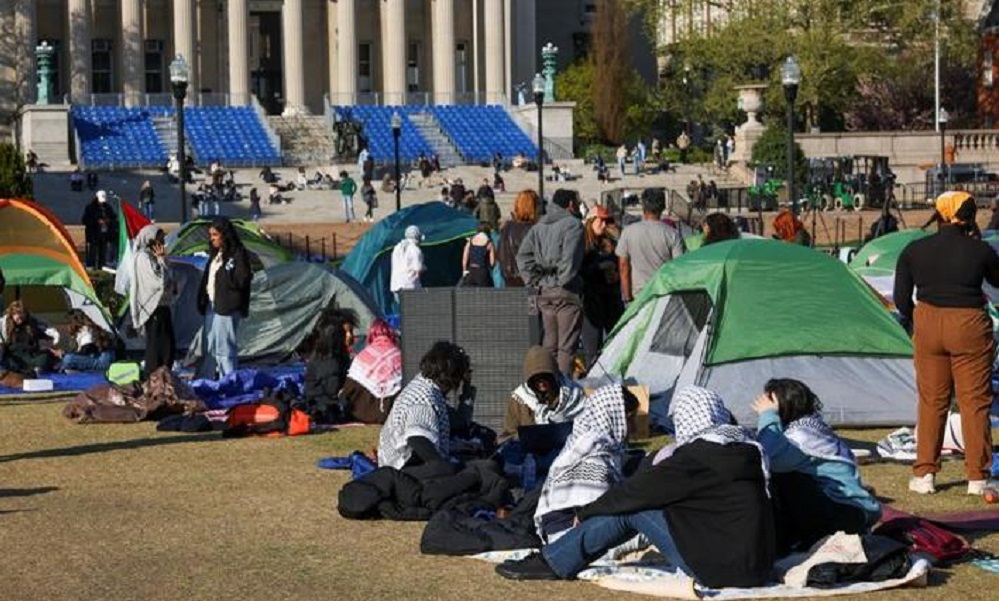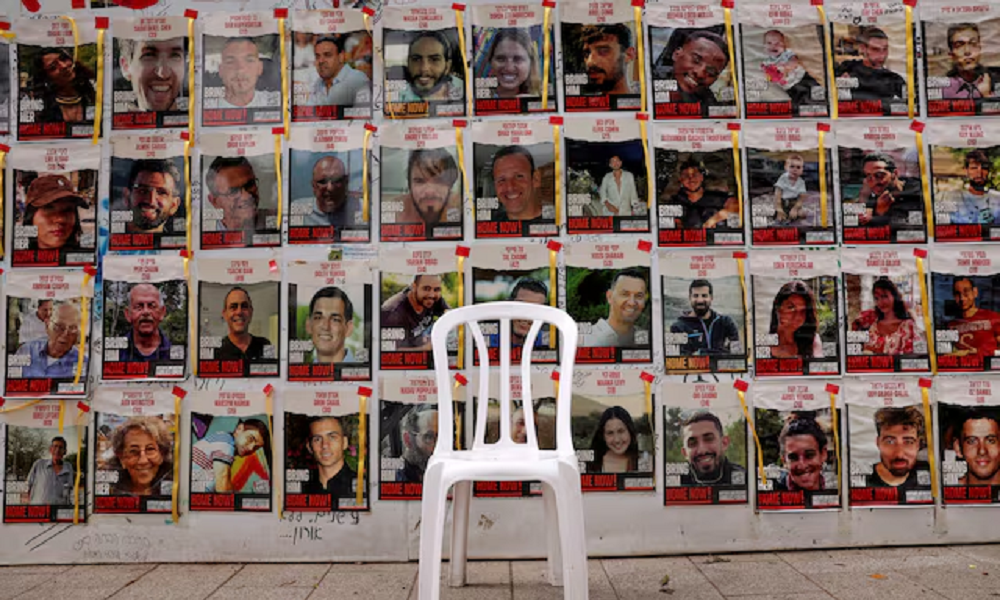World
Biden to Netanyahu: Protect civilians in Gaza or US policy will change

President Joe Biden threatened on Thursday to condition support for Israel’s offensive in Gaza on it taking concrete steps to protect aid workers and civilians, seeking for the first time to leverage U.S. aid to influence Israeli military behavior, Reuters reported.
Biden’s warning, relayed in a call with Prime Minister Benjamin Netanyahu on Thursday, followed a deadly Israeli attack on World Central Kitchen aid workers that spurred new calls from Biden’s fellow Democrats to place conditions on U.S. aid to Israel. Israel said the attack was a mistake.
The U.S. president, a lifelong supporter of Israel, has resisted pressure to withhold aid or halt the shipment of weapons to the country. His warning marked the first time he has threatened to potentially condition aid, a development that could change the dynamic of the nearly six-month-old war.
Biden “made clear the need for Israel to announce and implement a series of specific, concrete, and measurable steps to address civilian harm, humanitarian suffering, and the safety of aid workers,” the White House said of the leaders’ phone call. It said the call lasted about 30 minutes.
The president “made clear that U.S. policy with respect to Gaza will be determined by our assessment of Israel’s immediate action on these steps,” the White House said in a statement.
Washington is Israel’s top weapons supplier and the Biden administration has mostly provided a diplomatic shield for it at the United Nations, read the report.
At a briefing after the call, White House spokesperson John Kirby declined to elaborate on any specific changes the U.S. would make in its policy toward Israel and Gaza.
He said Washington hoped to see an announcement of Israeli steps in the “coming hours and days.”
By suggesting a shift in U.S. policy toward Gaza was possible if Israel did not address the humanitarian situation in the Palestinian enclave, Biden channeled his own frustration along with mounting pressure from his left-leaning political base in the Democratic Party to stop the killings and alleviate hunger among innocent civilians.
Asked about possible changes in U.S. policy, Netanyahu spokesperson Tal Heinrich told Fox News: “I think it’s something that Washington will have to explain”.
Later, the White House welcomed moves by Israel to open the Ashdod port and Erez crossing to increase deliveries of humanitarian assistance and to step up deliveries from Jordan directly into Gaza, Reuters reported.
But these steps, said White House spokesperson Adrienne Watson, “must now be fully and rapidly implemented.”
On Monday, Israel launched an attack that killed seven workers with the World Central Kitchen group, founded by celebrity chef Jose Andres. Andres told Reuters in an interview on Wednesday that the Israeli attack had targeted his aid workers “systematically, car by car.
Israel said on Thursday that it would adjust tactics in the Gaza war after describing the attack as the result of a misidentification and that inquiry findings would be made public soon.
The White House had described Biden as outraged and heartbroken by the attack but, prior to Thursday’s call, the president had made no fundamental change in Washington’s steadfast support for Israel in its conflict against Palestinian Hamas militants.
During the call, Biden “underscored that an immediate ceasefire is essential to stabilize and improve the humanitarian situation and protect innocent civilians,” the White House said. Biden urged Netanyahu to empower his negotiators to conclude a deal to bring home hostages captured by Hamas in its deadly Oct. 7 attack that triggered the Israeli offensive, it added.
In Brussels, U.S. Secretary of State Antony Blinken said Israel “must meet this moment” by surging humanitarian assistance and ensuring the security of those who provide aid.
“If we don’t see the changes that we need to see, there’ll be changes in our policy,” Blinken told reporters.
A U.S. official said the threat of policy changes applied only to the U.S. demand that Israel do more to protect and aid civilians but not to Biden’s urgency for a ceasefire.
Islamist fighters of the Palestinian militant group Hamas attacked Israel on Oct. 7, killing 1,200 people and seizing 253 hostages, according to Israeli tallies.
Israel retaliated by imposing a total siege on Gaza, then launching an air and ground assault that has killed more than 33,000 Palestinians, say health authorities in Hamas-ruled Gaza, read the report.
Biden, who has described himself as a Zionist, supported Israel staunchly in the early days of its retaliation.
But as the Gaza death toll rose and the war widened with new fronts in Lebanon and Yemen, his administration began pushing for a ceasefire and humanitarian aid access. Last month, the U.S. abstained from a United Nations Security Council vote demanding a ceasefire, drawing Israeli anger.
Biden also faces deep Democratic anger over his handling of the Gaza war, a dynamic that could depress support for him in November’s election contest against Republican former President Donald Trump.
Laura Blumenfeld, a Middle East analyst at the Johns Hopkins School for Advanced International Studies in Washington, said the strike on WCK aid workers “was the last straw.”
“This call was the long-promised ‘come to Jesus conversation’ that Biden said last month he would have with Netanyahu,” Blumenfeld said.
World
Blinken arrives in Saudi Arabia to discuss Israel normalization, post-war Gaza

U.S. Secretary of State Antony Blinken arrived in Saudi Arabia on Monday, the first stop in a broader trip to the Middle East to discuss issues including the governance of Gaza once the war with Israel ends.
The top U.S. diplomat heads to Israel later this week, where he is expected to press Israeli Prime Minister Benjamin Netanyahu to take the concrete and tangible steps U.S. President Joe Biden demanded this month to improve the dire humanitarian situation in Gaza.
In Riyadh, Blinken is expected to meet with senior Saudi leaders and hold a wider meeting with counterparts from five Arab states – Qatar, Egypt, Saudi Arabia, the United Arab Emirates and Jordan – to further the discussions on what governance of the Gaza Strip would look like after the war, according to a senior State Department official.
Blinken is also expected to bring together Arab countries with the European states and discuss how Europe can help the rebuilding effort of the tiny enclave, which has been reduced to a wasteland in the six-month long Israeli bombardment.
A group of European nations, including Norway, plan to recognise Palestinian statehood in conjunction with the presentation of an Arab state-backed peace plan to the United Nations.
“We can see by joining forces we can make this more meaningful. We really want to recognise the Palestinian state, but we know that is something you do once,” Norwegian Foreign Minister Espen Barth Eide told Reuters on the sidelines of a World Economic Forum meeting in Riyadh.
Blinkin’s trip comes as Egypt was expected to host leaders of the Islamist group Hamas to discuss prospects for a ceasefire agreement with Israel.
Hamas fighters attacked Israel on Oct. 7, killing 1,200 people and seizing 253 hostages, according to Israeli tallies.
Israel retaliated by imposing a total siege on Gaza, then launching an air and ground assault that has killed more than 34,000 Palestinians, say health authorities in Hamas-ruled Gaza.
Conversations over Gaza’s rebuilding and governance have been going on for months with a clear mechanism yet to emerge.
The United States agrees with Israel’s objective that Hamas needs to be eradicated and can no longer play a role in Gaza’s future but Washington does not want Israel to re-occupy the strip.
Instead, it has been looking at a structure that will include a reformed Palestinian Authority with support from Arab states.
Blinken will also discuss with Saudi authorities the efforts for a normalization deal between the kingdom and Israel, a mega deal that includes Washington giving Riyadh agreements on bilateral defense and security commitments as well as nuclear cooperation. – REUTERS
World
Police arrest scores of pro-Palestinian protesters on US university campuses

Pro-Palestinian protesters were arrested on a handful of U.S. university campuses on Saturday, as activists vowed to keep up the movement seeking a ceasefire in Israel’s war with Hamas among other demands.
The Indiana University police department in Bloomington said in an emailed statement that 23 protesters were arrested there.
Indiana State Police along with Indiana University police told demonstrators they could not pitch tents and camp on campus. When the tents were not removed, police arrested and transported protesters to the Monroe County Justice Center on charges of criminal trespass and resisting arrest.
“The Indiana University Police Department continues to support peaceful protests on campus that follow university policy,” the police statement read.
Pro-Palestinian protests have spread to college campuses across the U.S., stoked by the mass arrest of over 100 people on Columbia University’s campus last week.
In addition to a ceasefire, protesters are demanding that their schools divest from companies involved with Israel’s military and seeking an end to U.S. military assistance for Israel along with amnesty for students and faculty members who have been disciplined or fired for protesting.
School leaders at several universities have responded in the past week by asking police to clear out camps and arrest those who refuse to leave. While saying they defend free speech rights to protest, the leaders say they will not abide activists infringing on campus policies against hate speech or camping out on university grounds.
Massachusetts State Police said in a statement that they helped clear out a protest encampment at Northeastern University in Boston and that 102 protesters who refused to leave were arrested and will be charged with trespassing.
Northeastern University said in a statement on social media that it decided to call in police as “what began as a student demonstration two days ago was infiltrated by professional organizers with no affiliation to Northeastern.”
At Arizona State University, campus police arrested 69 protesters early Saturday, the school said in a statement.
The university said “a group of people – most of whom were not ASU students, faculty or staff – created an encampment and demonstration” and were arrested and charged with criminal trespass after refusing to disperse. – REUTERS
World
Hamas says it received Israel’s response to its ceasefire proposal

Hamas said it had received on Saturday Israel’s official response to its latest ceasefire proposal and will study it before submitting its reply, the group’s deputy Gaza chief said in a statement.
“Hamas has received today the official response of the Zionist occupation to the proposal presented to the Egyptian and the Qatari mediators on April 13,” Khalil Al-Hayya, who is currently based in Qatar, said in a statement published by the group.
After more than six months of war with Israel in Gaza, the negotiations remain deadlocked, with Hamas sticking to its demands that any agreement must end the war.
An Egyptian delegation visited Israel for discussion with Israeli officials on Friday, looking for a way to restart talks to end the conflict and return remaining hostages taken when Hamas fighters stormed into Israeli towns on Oct. 7, an official briefed on the meetings said.
The official, who spoke on condition of anonymity, said Israel had no new proposals to make, although it was willing to consider a limited truce in which 33 hostages would be released by Hamas, instead of the 40 previously under discussion.
On Thursday, the United States and 17 other countries appealed to Hamas to release all of its hostages as a pathway to end the crisis.
Hamas has vowed not to relent to international pressure but in a statement it issued on Friday it said it was “open to any ideas or proposals that take into account the needs and rights of our people”.
However, it stuck to its key demands that Israel has rejected, and criticised the joint statement issued by the U.S and others for not calling for a permanent ceasefire and the withdrawal of Israeli forces from Gaza.
White House national security adviser Jake Sullivan said on Friday he saw fresh momentum in talks to end the war and return the remaining hostages.
Citing two Israeli officials, Axios reported that Israel told the Egyptian mediators on Friday that it was ready to give hostage negotiations “one last chance” to reach a deal with Hamas before moving forward with an invasion of Rafah, the last refuge for around a million Palestinians who fled Israeli forces further north in Gaza earlier in the war.
Meanwhile, in Rafah, Palestinian health officials said an Israeli air strike on a house killed at least five people and wounded others.
Hamas fighters stormed into Israeli towns on Oct. 7, killing 1,200 people and capturing 253 hostages. Israel has sworn to annihilate Hamas in an onslaught that has killed more than 34,000 Palestinians.
-

 Latest News5 days ago
Latest News5 days agoOver 1,000 Afghan refugees forced out of Pakistan in one day
-

 Sport3 days ago
Sport3 days agoAfghanistan beat Iraq 5-3, inch closer to Futsal World Cup berth
-

 Regional3 days ago
Regional3 days agoNew UK sanctions target Iranian drone industry
-

 Regional4 days ago
Regional4 days agoTurkey accuses U.S. of double standards over Gaza in rights report
-

 Latest News3 days ago
Latest News3 days agoEU allocates 17 million euros to support Afghans on the move
-

 Latest News2 days ago
Latest News2 days agoPakistan extends registered Afghan refugees’ stay till June 30
-

 World4 days ago
World4 days agoUS student protests over Gaza intensify despite arrests
-

 Regional2 days ago
Regional2 days agoChina to host Hamas, Fatah for Palestinian unity talks
























